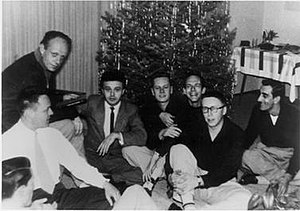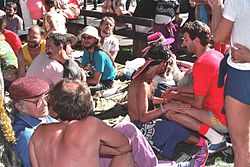Harry Hay is one of the most significant people in the "liberation movements" of mid-20th century America. Most people have never heard of him because Gay history is erased as quickly as it occurs.
I hope you enjoy this re-cap of Harry's life.
HARRY HAY, American activist http://www.harryhay.com
Born:
Died:
| Nickname | The Duchess |
A leader in the Gay Rights movement in the United States, known for founding the Mattachine Society in 1950 and the Radical Faeries in 1979. He was raised as a Catholic.
Harry was born in 1912 in the coastal town of Worthing, Sussex, England where he grew up until his parents emigrated to California in 1919. Starting in Los Angeles in 1950, Hay worked with a handful of supporters to found the Mattachine Society. At this time, nineteen years before the Stonewall Riots, virtually no Gays or Lesbians were publicly out, it was illegal for homosexuals to gather in public, and the American Psychiatric Association defined homosexuality as a mental illness. Very slowly, he gathered members to this group. The Mattachine Society met in secret, with members often accompanied by a female friend to prevent being publicly identified as Gay. Though Henry Gerber’s Gay Rights group The Society for Human Rights had briefly flowered in Chicago twenty years earlier, it was quickly shut down by authorities. Hay's successful launching of a lasting national Gay network makes him a plausible entry for the founder of the American Gay rights movement.
Although Harry Hay claimed 'never to have even heard of the earlier Gay liberation struggle in Germany - by the people around Adolph Brand, Magnus Hirshfeld and Leontine Sagan - he is known to have talked about it with European emigrés in America including Mattachine co-founder Rudi Gernreich. (However, Gernreich arrived in America at age 14, and Hay had already written his Gay manifesto when they met).
A married man (beard/wife Anita Platky) and a member of the Communist Party USA, Hay composed the first manifesto of the American Gay rights movement in 1948, writing:
We, the Androgynes of the world, have formed this responsible corporate body to demonstrate by our efforts that our physiological and psychological handicaps need be no deterrent in integrating 10 percent of the world's population towards the constructive social progress of mankind.
In 1950, in the midst of America’s most conservative decade, Harry Hay started the Mattachine Society, the country’s first successful gay liberation organization. Harry’s ideas would become the guiding principles of the US gay rights movement.
Harry began his activist life in the 1930’s fighting for worker’s rights in the labor movement. Soon after meeting fellow activist Will Geer, Harry became an active member of the Communist Party and a celebrated Marxist teacher. While later abandoned by most activists, at that time the Party was on the cutting edge of social change in the US. As fellow activist Frank Pestana says, “They were fighting for workmen’s comp, job security, medical care, social security - all the things that we have now.”
It was Harry’s experience organizing in these activist movements that gave him the tools he needed to create a secret, underground homosexual organization in Los Angeles. In a climate of extreme oppression, Mattachine provided enough safety and security for homosexuals to gather together and take steps towards their own liberation. The Mattachine Society would eventually spread to major cities across the country.
He soon dispensed with the apologetic language and ideas entirely. Though it may seem dated today, the group was very radical compared to the rest of society at the time of its beginnings. It and Hay were among the first to advance the argument that Gay people represented a "cultural minority" as well as being just individuals, and even called for public marches of homosexuals, predicting later Gay pride parades. Hay's concept of the "cultural minority" came directly from his Marxist studies, and the rhetoric he and his colleague Charles Rowland employed often reflected the militancy of Communist tradition. As the Mattachine Society grew with chapters around the country, the organization saw the Communist ties of its founders, including Hay, as a threat during that McCarthyite witch-hunt era, and expelled them from leadership. The organization took a more cautious tack so that by the time of the Stonewall riots the Mattachine Society came to be seen by many as stodgy and assimilationist.
Hay later became an outspoken critic of Gay assimilationism and went on to help found both Jesse Jackson’s Rainbow Coalition and the Gay men's group the Radical Faeries, as well as being active in the Native American movements.
"We pulled ugly green frog skin of heterosexual conformity over us, and that's how we got through school with a full set of teeth," Hay once explained. "We know how to live through their eyes. We can always play their games, but are we denying ourselves by doing this? If you're going to carry the skin of conformity over you, you are going to suppress the beautiful prince or princess within you.”
One of his first lovers in the early '30s was actor Will Geer, who found fame as "Grandpa Walton" on The Walton’s. Hay later wrote about their political activism and how he and Geer were present at the San Francisco General Strike in July 1934. Hay, along with Roger Barlow and LeRoy Robbins directed a short film Even As You and I (1937) featuring Hay, Barlow, and filmmaker Hy Hirsh.
Harry in the 1980s
In 1963, at age 51, he met an inventor named John Burnside, who became his life partner. They lived first in Los Angeles, and later in a Pueblo Indian reserve in New Mexico. After returning to Los Angeles to organize the Radical Faerie movement with Don Kilhefner and Mitch Walker, the couple moved to San Francisco, where Hay died of lung cancer at age 90. Burnside passed in September 2008 of brain cance
Hay was the subject of the 2002 documentary by Eric Slade, "Hope along the Wind: The Life of Harry Hay" (2002). He also appeared in other documentaries such as "Word is Out" (1978).
*Thanks to our good friends at The White Crane Institute and gaywisdom.org. Are you getting their FREE daily emails on gay history?
(go to: http://www.gaywisdom.org/list.html to sign up now!)
And if you can you help support their important work for our community with any amount...please do!
(go to: http://www.gaywisdom.org/list.html to sign up now!)
And if you can you help support their important work for our community with any amount...please do!





No comments:
Post a Comment